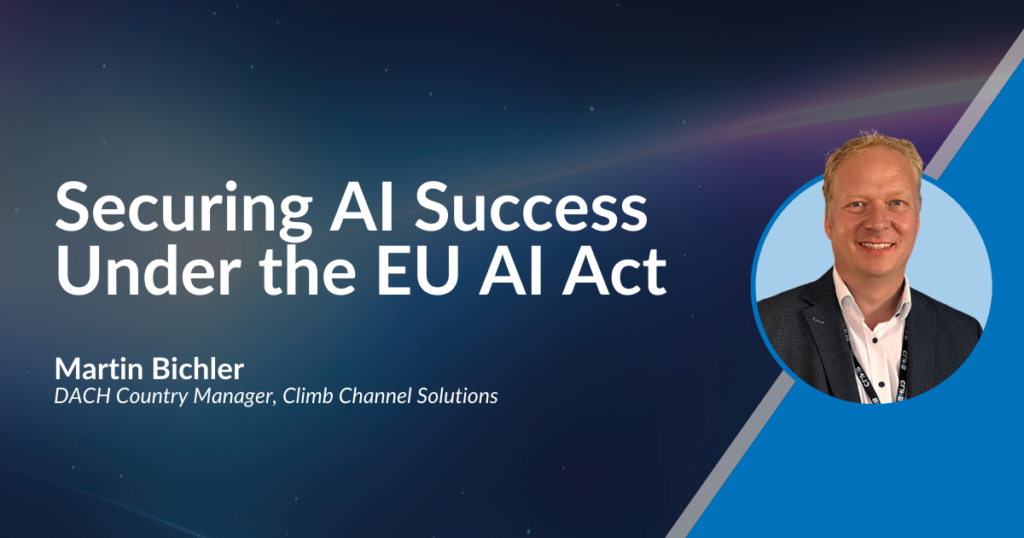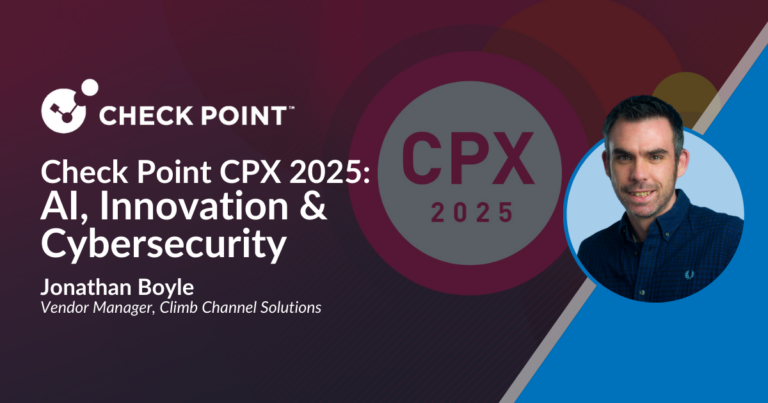
Artificial intelligence is now central to how businesses operate and innovate—and the channel is talking about it like never before.
But with great power comes great responsibility—and, in the EU, a regulatory framework to match. The EU AI Act, finalised in 2024, aims to harmonise AI governance across member states, ensuring AI is safe, ethical, and transparent while fostering investment and innovation.
For many channel partners and their customers, this regulation may seem daunting. Large enterprises might have the resources to navigate its requirements, but smaller partners often lack the capacity to quickly digest and implement yet another regulatory framework. This is where Climb Channel Solutions can help decode the EU AI Act and empower you to turn compliance into an opportunity—not only to mitigate risks but to position AI compliance and data integrity as a competitive advantage.
What Is the EU AI Act?
The EU AI Act is the world’s first comprehensive regulation of artificial intelligence. It categorises AI systems into risk levels—unacceptable, high, limited, and minimal—and imposes stringent obligations for high-risk systems. These high-risk applications are used frequently in sectors such as law enforcement, healthcare, insurance, recruitment, and education.
Key obligations for high-risk systems include:
- Risk management and assessment: Organisations must identify and mitigate risks associated with their AI systems.
- Data quality and security: High-risk AI systems must use high-quality, unbiased data that respects privacy and data protection laws.
- Transparency: Users should understand how AI systems work, and the systems must provide clear, explainable outputs.
- Human oversight: AI must not operate in isolation—human accountability is key to its safe and ethical use.
Most provisions will take effect in August 2026, with certain rules for prohibited AI systems starting as early as February 2025.
Challenges for Partners: The Skills and Resources Gap
For many partners, compliance with the EU AI Act is just one of many challenges—but it’s a particularly complex one. Understanding what compliance entails can be difficult, especially when it comes to defining AI systems, collecting data appropriately, and ensuring transparency in AI decision-making.
While large enterprises may have compliance and data managers in place, smaller partners—working with mid-sized businesses or local enterprises—often face greater hurdles:
- Limited resources: Many lack dedicated teams to oversee AI compliance.
- Skills gaps: Few organisations have individuals trained in the nuances of AI governance and security.
- Strategic direction: Even fewer have a clear roadmap for integrating AI in a way that aligns with the Act’s requirements.
Without a trained AI manager to oversee compliance, these gaps leave organisations exposed to risks—not just regulatory penalties but also reputational damage.
Why Data Integrity and Security Matter
Data integrity is central to the EU AI Act. For organisations required to comply, it’s crucial to ensure that data is:
- Accounted for: Understand what data is being collected, where it’s stored, and how it’s processed—with minimum logging requirements.
- Governed: Appropriate data management and governance practices are essential to ensure dataset quality.
- Secure: Robust cybersecurity measures are essential.
AI’s reliance on vast datasets makes these precautions non-negotiable. For example, a fragmented storage approach—data scattered across multiple systems and locations—can hinder compliance and expose organisations to cyber risks. Consolidation and protection of data are important in any compliance strategy.
Building a Path to Compliance
For organisations impacted by the EU AI Act, proactive steps are necessary, and the Climb team recommends:
- Assess risks: Conduct a thorough review of AI systems to understand their potential risks and compliance requirements.
- Raise awareness: Educate employees on the Act’s implications and their role in ensuring compliance.
- Design ethical systems: Build AI solutions that align with legal, ethical, and societal expectations.
- Establish governance: Assign responsibility to trained personnel who can oversee AI compliance and security.
Bridging the Gap with Education
Recognising the challenges partners face, we’ve developed Climb’s AI Academy to help you close the AI skills gap. This program equips IT professionals with the knowledge and tools they need to manage AI systems responsibly.
Through a minimum 30-hour training course, participants gain expertise in:
- Understanding AI risks.
- Implementing the right infrastructure and AI solutions.
- Ensuring data protection and integrity.
- Developing AI management tools and skills.
By the end of the program, we hope that partners will be well-equipped to guide their customers through EU AI Act compliance, enabling them to confidently lead their organisations in adopting and leveraging AI responsibly.
The Climb Advantage
The EU AI Act is a chance for channel partners to lead the way in ethical, secure, and innovative AI adoption. Whether by supporting customers with compliance or serving as a trusted AI specialist, partners who invest in skills, strategy, and secure data practices can turn compliance into a competitive advantage.
Want to learn more? Our AI Academy is your starting point for understanding and mastering the EU AI Act. Get in touch with me today to learn more on martinb@climbcs.eu .
Upcoming Climb AI Academy Courses
All courses can be held in both English and German. All courses can also be held virtually if required. If you have any questions please contact martinb@climbcs.eu
- AI-Orientation Express (Online) | 12th December 2024
- A 2-hour virtual express orientation training for AI beginners that addresses different topics. This course provides a brief but effective insight into AI concepts and applications
- AI-Manager (In-Person) | 3rd February – 6th February 2025
- This course teaches you the essential fundamentals of artificial intelligence so that you can better understand how AI systems work.
- AI-Culture Manager (In-Person) | 2nd December 2024
- This intensive course provides the necessary knowledge and skills to successfully integrate artificial intelligence into the corporate culture.
- AI-Product Manager (In-Person | 3rd December 2024
- This one-day intensive course is aimed at product managers who want to expand their knowledge and skills in the area of artificial intelligence.
- AI-Prototyping Manager | (In-Person) 5th December 2024
- AI Prototyping Labs is an intensive, hands-on workshop program designed to equip participants in small groups with the skills to quickly and efficiently create their own AI prototypes using AI tools.


